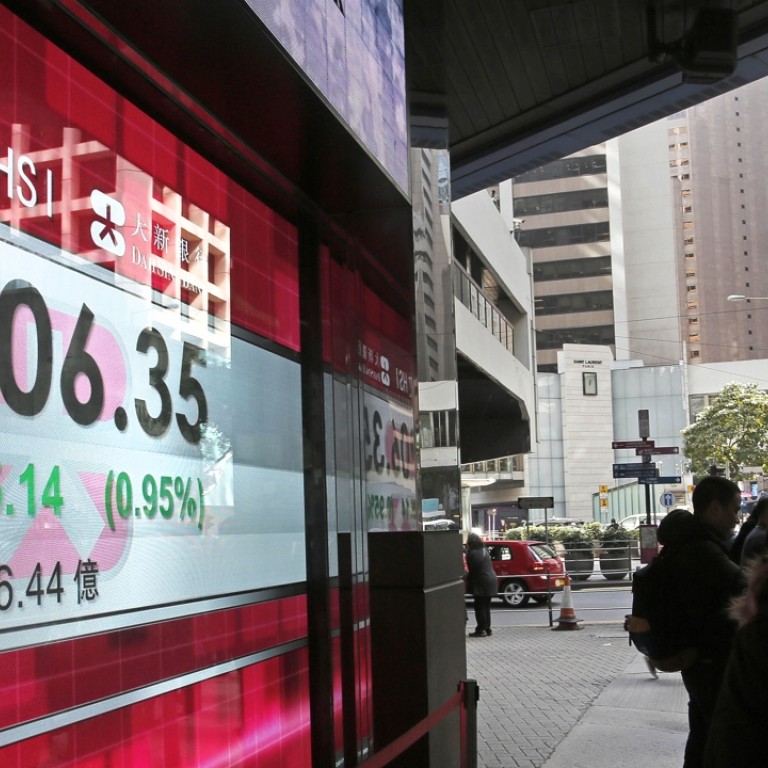
New | Hong Kong stock market poised to have worst year since 2011; China A-shares on track for gain in wild, turbulent 2015
Hang Seng Index may see fall of 7 per cent in 2015, H-share index could see tumble of 18 per cent. But Shanghai on cusp of 10 per cent rise and Shenzhen up 65 per cent as good times roll in China’s stock markets
Hong Kong’s stock market is on track to put in its worst year since 2011 while the Shanghai and Shenzhen A-share markets are poised to ring up robust gains despite a summer rout which saw Chinese stocks lose US$4 trillion at the height of the sell-off.
Analysts said the contrast is caused mainly by the fact Hong Kong shares are exposed to international risks such as the US interest rate increase in December, while China’s A-shares were bolstered by rescue measures mounted by Beijing and the so-called “national team” support which bought up stocks despite worries over China’s economic slowdown and a surprise yuan devaluation in August.
The Hong Kong benchmark Hang Seng Index (HSI) closed on Wednesday at 21,882.15, off 117.47 points or 0.53 per cent on the day. The Index is down 7.30 per cent or 1,722.89 points year to date with only a half day session on Thursday left for 2015.
Trade will be flat from now on till the end of the Chinese Lunar New Year...Investors tend to make portfolio adjustments after February, when they are more certain about the outlook
At this rate, it would mark its worst performance since plunging 19.97 per cent in 2011 when the city’s bourse was hard hit by the European zone crisis.
The Hang Seng China Enterprises index (HSCEI), which tracks Hong Kong-listed mainland Chinese companies, ended at 9,659.88. It has tumbled 19.40 per cent so far this year.
Equity markets in Hong Kong and in China are shut on Friday for New Year, reopening for business on Monday, January 4.
Kevin Leung, director of global investment strategy at Haitong International Securities, said the Hong Kong stock market would for the most part still be following the Chinese and US markets for direction in the coming months.
“Trade will be flat from now on till the end of the Chinese Lunar New Year. And investors tend to make portfolio adjustments after February, when they are more certain about the outlook.”
In comparison, China’s benchmark Shanghai Composite Index ended on Wednesday at 3,572.89, up 0.26 per cent for the session, with the index on track to post an increase of over 10 per cent in 2015. This follows a 52.87 per cent gain in 2014.
The large-cap CSI300 settled at 3,765.18, up 6.57 per cent year to date.
The Shenzhen Composite Index finished at 2,351.35, on track for a gain of 66.15 per cent in 2015. The index is poised to ring up its fourth consecutive year of gains.
The Nasdaq-style ChiNext Index in Shenzhen was also in line to post an increase of nearly 89 per cent for 2015, having concluded at 2,779.51 on Wednesday.
Christopher Cheung Wah-fung, a legislator for the financial services sector, said Hong Kong shares’ movements are determined by market forces while mainland China’s A-shares are “managed” by Beijing to explain the divergence in the performance of both markets.
“This has allowed the A-share markets in Shanghai and Shenzhen to report a gain while Hong Kong posts a loss for the whole year,” Cheung said. “The Hong Kong markets are likely to continue to perform differently from the mainland A-shares market next year.”
“Mainland China has tight control over short selling while Hong Kong is a free market which allows legal short selling. This has led foreign investors to use Hong Kong as a proxy for their bearish view to sell Chinese stocks, which is why the H-shares Index dropped substantially this year while Shanghai and Shenzhen have solid gains,” said Ben Kwong Man-bun, executive director of KGI Asia.
The Hang Seng index has fluctuated by over 8,000 points during the year, with Wednesday’s close down 23.46 per cent from its peak on April 27 when the index touched a seven-year peak at 28,588.52 when Chinese mutual funds were allowed to invest in Hong Kong stocks via the cross border stock connect scheme that linked the Hong Kong and Shanghai markets.
The Shanghai index, for its part, has swung by over 2,000 points for the year, soaring 60 per cent to a seven-year high in mid-June at 5,178.19 on June 12 before crashing 43 per cent within two months to a year low at 2,850.71.
“Chinese stock markets had a volatile year, which was full of surprises,” said Kinger Lau, an analyst for Goldman Sachs.
“For 2015, we argued that easy liquidity and reforms could re-rate Chinese stocks even in a slowing growth environment,” Goldman analysts said in a 2016 outlook report earlier this month.



